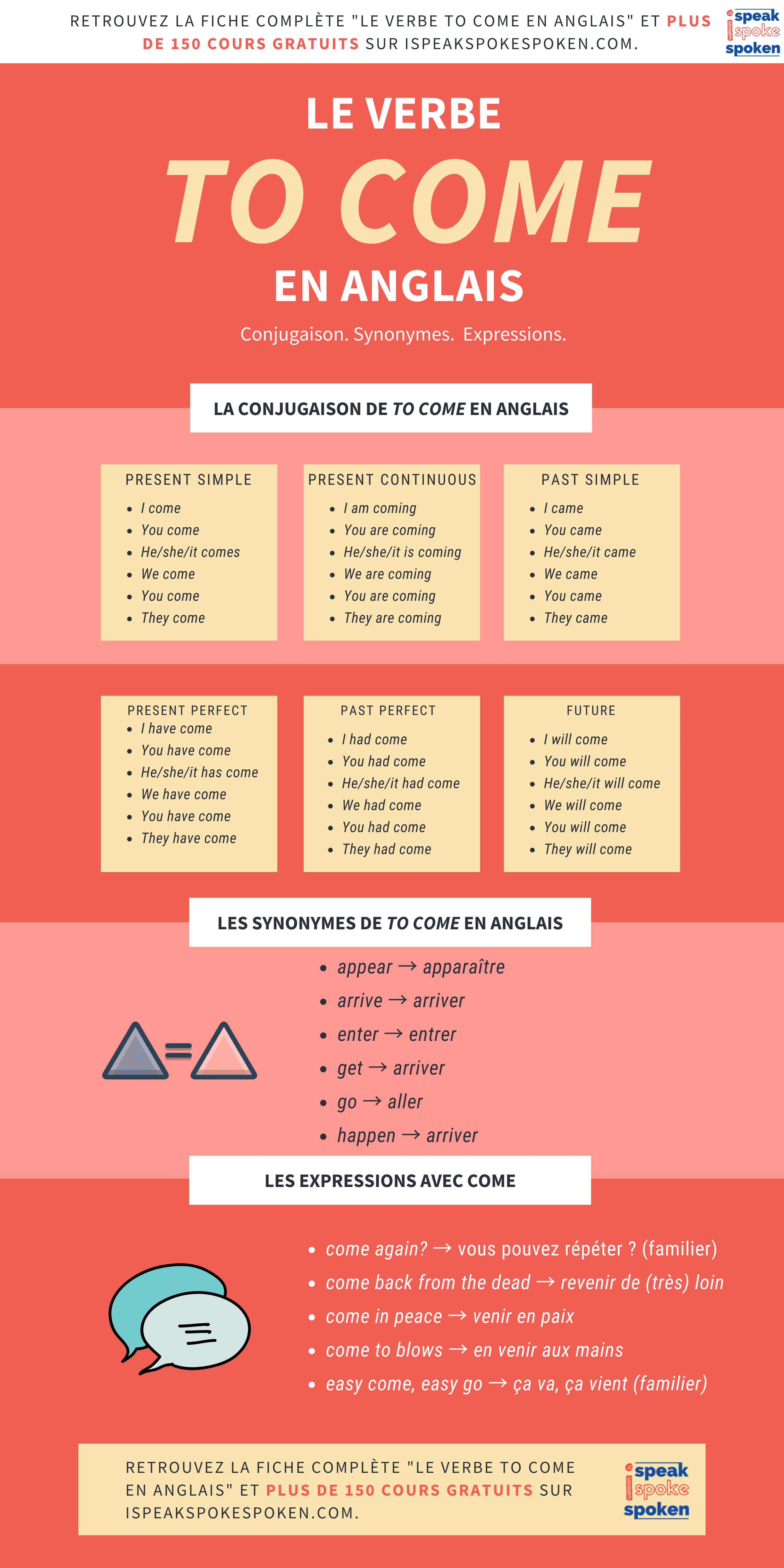Quelle est la conjugaison de come en anglais ? Quelles sont ses nombreuses définitions et quels sont les multiples phrasal verbs, synonymes et expressions liés à ce verbe ? Réponse !
Tableaux de conjugaison de come en anglais
Conjugaison du verbe come à l’indicatif
Le verbe come au present simple
- I come
- You come
- He/she/it comes
- We come
- You come
- They come
Le verbe come au present continuous
- I am coming
- You are coming
- He/she/it is coming
- We are coming
- You are coming
- They are coming
Le verbe come past simple
- I came
- You came
- He/she/it came
- We came
- You came
- They came
Le verbe come au past continuous
- I was coming
- You were coming
- He/she/it was coming
- We were coming
- You were coming
- They were coming
Le verbe come au present perfect
- I have come
- You have come
- He/she/it has come
- We have come
- You have come
- They have come
Le verbe come au present perfect continuous
- I have been coming
- You have been coming
- He/she/it has been coming
- We have been coming
- You have been coming
- They have been coming
Le verbe come au past perfect
- I had come
- You had come
- He/she/it had come
- We had come
- You had come
- They had come
Le verbe come au past perfect continuous
- I had been coming
- You had been coming
- He/she/it had been coming
- We had been coming
- You had been coming
- They had been coming
Le verbe come au future
- I will come
- You will come
- He/she/it will come
- We will come
- You will come
- They will come
Le verbe come au future continuous
- I will be coming
- You will be coming
- He/she/it will be coming
- We will be coming
- You will be coming
- They will be coming
Le verbe come au future perfect
- I will have come
- You will have come
- He/she/it will have come
- We will have come
- You will have come
- They will have come
Le verbe come au future perfect continuous
- I will have been coming
- You will have been coming
- He/she/it will have been coming
- We will have been coming
- You will have been coming
- They will have been coming
Conjugaison du verbe come au conditionnel
Le verbe come au conditional present
- I would come
- You would come
- He/she/it would come
- We would come
- You would come
- They would come
Le verbe come au conditional present continuous
- I would be coming
- You would be coming
- He/she/it would be coming
- We would be coming
- You would be coming
- They would be coming
Le verbe come au conditional perfect
- I would have come
- You would have come
- He/she/it would have come
- We would have come
- You would have come
- They would have come
Le verbe come au conditional perfect continuous
- I would have been coming
- You would have been coming
- He/she/it would have been coming
- We would have been coming
- You would have been coming
- They would have been coming
Les autres formes
L’infinitif de come
- to come
Participe présent de come
- coming
Participe passé de come
- come
L’impératif de come
- come
- let’s come
Note : to come est un verbe irrégulier. Découvrez les autres verbes irréguliers anglais.
Définition de come en anglais
Que veut dire le verbe come en anglais ?
Le Cambridge Dictionary donne plusieurs définitions du verbe come.
Penchons-nous sur les principales :
1. To move or travel towards the speaker or with the speaker
I don’t think she’s going to come with us. → Je ne pense pas qu’elle va venir avec nous.
2. To move or travel in the direction of the person being spoken to
I’ll come at 8 pm and we’ll have dinner together. → – Je viendrai à 20 h et nous dînerons ensemble.
3. To get to a particular place
They came home last week. → Il sont rentrés la semaine dernière.
4. To change or develop so as to be in a different position or condition
I tried this and it came out OK. → J’ai essayé ça et ça a marché.
5. To happen
It came as a surprise. → Ce fut une surprise.
6. To exist or be available
This device that we sell comes in different sizes. → Cet appareil que nous vendons existe en plusieurs formats.
7. To have an orgasm
They came at the same time. → Ils ont joui ensemble.
Pour accéder à l’intégralité de la page du Cambridge Dictionary, cliquez ici !
Les phrasal verbs avec come en anglais
Rappel : les phrasal verbs (ou “verbes à particule”) sont des verbes qui, lorsqu’ils sont suivis d’un autre mot (la particule), voient leur sens initial complété ou modifié.
Voici les principaux phrasal verbs formés sur le verbe come :
- come about → arriver, se produire
- come across somebody → croiser quelqu’un par hasard
- come across something → trouver quelque chose par hasard
- come after somebody/someone → poursuivre quelqu’un ou quelque chose (familier)
- come along with somebody → accompagner quelqu’un
- come apart → tomber en morceaux, se désintégrer
- come around → reprendre ses esprits ou changer d’avis
- come away → partir, s’en aller
- come back → revenir, rentrer
- come before somebody → comparaître devant (un juge, une cour)
- come between somebody → séparer, se mettre entre deux personnes
- come by → passer voir quelqu’un, visiter quelqu’un
- come down → s’effondrer, s’écrouler
- come forward → se proposer, se porter volontaire
- come from → venir de, provenir de
- come in → intervenir, entrer en scène
- come in for something → être la cible de quelque chose (familier)
- come into something → toucher, recevoir (de l’argent)
- come off → être une réussite, être un succès
- come on → allez, arrête (interjection)
- come out → sortir ou révéler son homosexualité (familier)
- come over → passer, faire un saut (familier)
- come through → réussir, surmonter (familier)
- come to something → en matière de (when it comes to…)
- come up → être posé, être soulevé (pour une question ou un sujet)
- come up against → se heurter à
- come up with → imaginer, inventer
- come upon → tomber sur, trouver par hasard
Les synonymes de come en anglais
En fonction du contexte, vous pouvez remplacer le verbe to come par l’un des verbes suivants :
- appear → apparaître
- arrive → arriver
- become → devenir
- enter → entrer
- get → arriver
- go → aller
- happen → arriver
- occur → se produire, exister
Expressions avec come en anglais
- come a cropper → se planter (familier)
- come again? → vous pouvez répéter ? / tu peux répéter ? (familier)
- come apart at the seams → aller de travers
- come at a price → ne pas avoir que des avantages
- come back from the dead → revenir de (très) loin
- come clean → tout avouer, cracher le morceau (familier)
- come close to something → frôler, faillir faire quelque chose
- come face to face with somebody/something → se retrouver nez à nez avecquelqu’un/quelque chose
- come first → arriver en premier
- come full circle → la boucle est bouclée
- come hell or high water → quoi qu’il advienne, quoi qu’il arrive
- come in handy → être utile
- come in peace → venir en paix
- come into being → voir le jour
- come into your own → être reconnu à sa juste valeur
- come to a decision → parvenir à une décision
- come to blows → en venir aux mains
- come to the fore → monter au créneau
- come unstitched → aller de travers, partir à vau-l’eau
- easy come, easy go → ça va, ça vient (familier)
- for a long time to come → pour longtemps
- until kingdom come → jusqu’à la fin des temps ou jusqu’à la saint-glinglin (familier)
À l’image de choose, wear, see, learn et find, to come est aussi un verbe irrégulier. Vous devez donc particulièrement faire attention aux terminaisons du passé.


